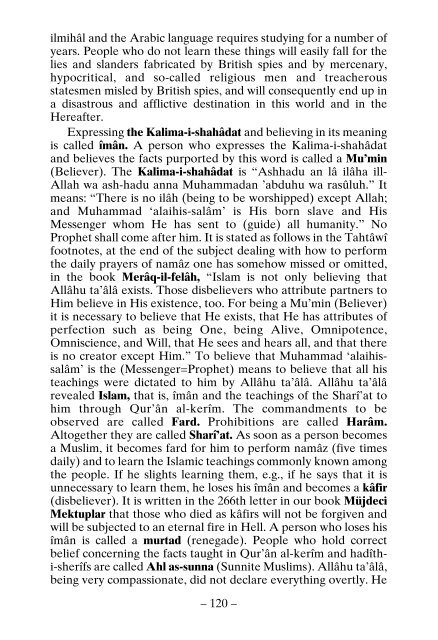Confessions Of A British Spy
Muhammad of Najd was the sort I had been looking for. For his scorn for the time’s scholars, his slighting even the (earliest) four Khalîfas, his having an independent view in understanding the Qur’ân and the Sunna were his most vulnerable points to hunt and obtain him. So different this conceited youngster was from that Ahmed Efendi who had taught me in Istanbul! That scholar, like his predecessors, was reminiscent of a mountain. No power would be able to move him. Whenever he mentioned the name of Abû Hanîfa, he would stand up, go and make an ablution. Whenever he meant to hold the book of Hadîth named he would, again, make an ablution. The Sunnîs trust this book very much. Muhammed of Najd, on the other hand, disdained Abû Hanîfa very much. He would say, “I know better than Abû Hanîfa did. In addition, according to him, half of the book of wrong.
Muhammad of Najd was the sort I had been looking for. For
his scorn for the time’s scholars, his slighting even the (earliest)
four Khalîfas, his having an independent view in understanding
the Qur’ân and the Sunna were his most vulnerable points to hunt
and obtain him. So different this conceited youngster was from
that Ahmed Efendi who had taught me in Istanbul! That scholar,
like his predecessors, was reminiscent of a mountain. No power
would be able to move him. Whenever he mentioned the name of
Abû Hanîfa, he would stand up, go and make an ablution.
Whenever he meant to hold the book of Hadîth named he would, again, make an ablution. The Sunnîs trust this book
very much.
Muhammed of Najd, on the other hand, disdained Abû Hanîfa
very much. He would say, “I know better than Abû Hanîfa did.
In addition, according to him, half of the book of wrong.
You also want an ePaper? Increase the reach of your titles
YUMPU automatically turns print PDFs into web optimized ePapers that Google loves.
ilmihâl and the Arabic language requires studying for a number of<br />
years. People who do not learn these things will easily fall for the<br />
lies and slanders fabricated by <strong>British</strong> spies and by mercenary,<br />
hypocritical, and so-called religious men and treacherous<br />
statesmen misled by <strong>British</strong> spies, and will consequently end up in<br />
a disastrous and afflictive destination in this world and in the<br />
Hereafter.<br />
Expressing the Kalima-i-shahâdat and believing in its meaning<br />
is called îmân. A person who expresses the Kalima-i-shahâdat<br />
and believes the facts purported by this word is called a Mu’min<br />
(Believer). The Kalima-i-shahâdat is “Ashhadu an lâ ilâha ill-<br />
Allah wa ash-hadu anna Muhammadan ’abduhu wa rasûluh.” It<br />
means: “There is no ilâh (being to be worshipped) except Allah;<br />
and Muhammad ‘alaihis-salâm’ is His born slave and His<br />
Messenger whom He has sent to (guide) all humanity.” No<br />
Prophet shall come after him. It is stated as follows in the Tahtâwî<br />
footnotes, at the end of the subject dealing with how to perform<br />
the daily prayers of namâz one has somehow missed or omitted,<br />
in the book Merâq-il-felâh, “Islam is not only believing that<br />
Allâhu ta’âlâ exists. Those disbelievers who attribute partners to<br />
Him believe in His existence, too. For being a Mu’min (Believer)<br />
it is necessary to believe that He exists, that He has attributes of<br />
perfection such as being One, being Alive, Omnipotence,<br />
Omniscience, and Will, that He sees and hears all, and that there<br />
is no creator except Him.” To believe that Muhammad ‘alaihissalâm’<br />
is the (Messenger=Prophet) means to believe that all his<br />
teachings were dictated to him by Allâhu ta’âlâ. Allâhu ta’âlâ<br />
revealed Islam, that is, îmân and the teachings of the Sharî’at to<br />
him through Qur’ân al-kerîm. The commandments to be<br />
observed are called Fard. Prohibitions are called Harâm.<br />
Altogether they are called Sharî’at. As soon as a person becomes<br />
a Muslim, it becomes fard for him to perform namâz (five times<br />
daily) and to learn the Islamic teachings commonly known among<br />
the people. If he slights learning them, e.g., if he says that it is<br />
unnecessary to learn them, he loses his îmân and becomes a kâfir<br />
(disbeliever). It is written in the 266th letter in our book Müjdeci<br />
Mektuplar that those who died as kâfirs will not be forgiven and<br />
will be subjected to an eternal fire in Hell. A person who loses his<br />
îmân is called a murtad (renegade). People who hold correct<br />
belief concerning the facts taught in Qur’ân al-kerîm and hadîthi-sherîfs<br />
are called Ahl as-sunna (Sunnite Muslims). Allâhu ta’âlâ,<br />
being very compassionate, did not declare everything overtly. He<br />
– 120 –


